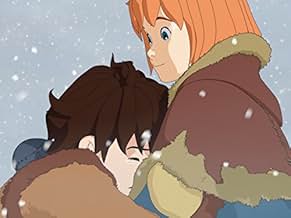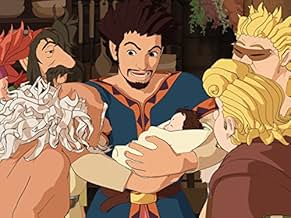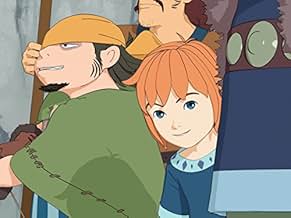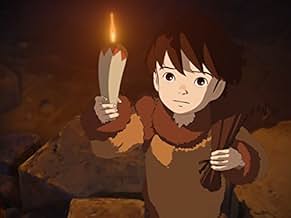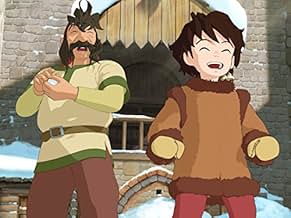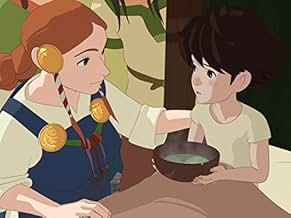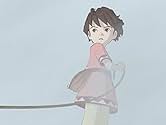Ronja, la hija del bandolero
Título original: Sanzoku no musume Rônya
CALIFICACIÓN DE IMDb
7.0/10
1 k
TU CALIFICACIÓN
La trama no ha sido revelada.La trama no ha sido revelada.La trama no ha sido revelada.
Explorar episodios
Opiniones destacadas
I and my kiddos (8 year old girl, 5 year old boy) watched this during summer 2020. We all got really into it and watched 2 or 3 episodes each night, which probably qualifies as binging for this age rage. The series features beautiful if fairly simple animation, a catchy introductory song, and an exciting storyline that manages to be slow-paced and episodic, with the narrative focused mostly on Ronya growing up. The beautiful forest is the spiritual focus of the series, and Ronya loves to explore it. Yet danger lurks not only through natural hazards, but also the evil harpies and other spirits, as well as the violent life of Ronya's robber family. Especially their feud with the rival robber clan that has moved into the other side of their castle, and its young prince "Birk," Ronya's love interest. The generally tranquil (despite the dangers) and joyful feel of the series contrasts uncomfortably with the fact that most of the people whose lives are empathetically chronicled are hardened criminals, despite the fact that they don't seem ever to kill anyone. But the series is redeemed by Ronya and Birk, who reject their parents' feud and their lifestyle, as well as Ronya's strong relationship with her father Mattis, who ultimately is convinced to give up his family's traditional "profession" because of her. Also, my kids loved calling Mattis a "man-baby" and calling out his various "meltdowns"!
What would otherwise have been a beautiful animation series has been completely ruined by the miscasting of the lead voice in English. Ronja is supposed to be 11 years old - My daughter (8) has been constantly mocking the voice of Ronja as she says she sounds like a toddler. The voice is so gratingly irritating it has completely destroyed any enjoyment of the series there might otherwise have been.
I sympathise with the other comments of the music and voice dubbing in English which seems disjointed but all of this might have been forgiven as the animation, characters and creatures would be engaging in themselves.
I expect that the original in Japanese would not suffer from these drawbacks. So it is down to me and my children to study Japanese, or perhaps we could beg the production company to re-voice Ronja, then I might shell out the £25 for the DVD box set for a second time!
I sympathise with the other comments of the music and voice dubbing in English which seems disjointed but all of this might have been forgiven as the animation, characters and creatures would be engaging in themselves.
I expect that the original in Japanese would not suffer from these drawbacks. So it is down to me and my children to study Japanese, or perhaps we could beg the production company to re-voice Ronja, then I might shell out the £25 for the DVD box set for a second time!
I think this deserves far more praise than it seems to have received.
I'm from Sweden, born in the early 80s. I grew up with Astrid Lindgrens books and the TV-series and movies based on them. They are widely considered great stories, and I agree. But I cannot say that any of them really have deeply moved or affected me, including Ronja Rövardotter. Up until now. The fact that it took a Japanese animation studio for me to realize just how good this tale is says something about this series.
I was a bit skeptical to the visual style first, and it took a few episodes before I gave in, but after that, I just loved it. The cell-shaded style reminds me of The Legend of Zelda: Breath of the Wild, another Japanese masterpiece, and there is something beautiful to behold in almost every scene.
Studio Ghibli have treated this story with utmost respect and it shows that they really have understood it, which may sound trivial, but I think it isn't. The central characters feel very lifelike, with all their strengths, flaws, vulnerabilities, prides, fears and hopes. I can't imagine anyone doing a better work, and the attention to detail is just incredible. Just one in a myriad of examples: when Ronja goes skiing in the winter, it shows that they must have studied exactly how a person moves on skis.
Another thing I admire with studio Ghibli's work is that they have the courage to stay in a moment, and portray beautiful things, even small things like raindrops falling on leaves. Their love for nature really shines through, and it makes you want to also be in that beautiful forest - hadn't it been for the horrible harpies.
I watched this in Japanese with English subtitles, which I strongly recommend over the English dubbed version, if possible. I like how they have kept all the original names and to hear them pronounced in Japanese. Many of them sound strange also in Swedish even for a Swedish person; Astrid Lindgren apparently got most of them from a map of northern Sweden.
Thank you, studio Ghibli, for this. I'm very grateful. Domo arigato gozaimasu.
I'm from Sweden, born in the early 80s. I grew up with Astrid Lindgrens books and the TV-series and movies based on them. They are widely considered great stories, and I agree. But I cannot say that any of them really have deeply moved or affected me, including Ronja Rövardotter. Up until now. The fact that it took a Japanese animation studio for me to realize just how good this tale is says something about this series.
I was a bit skeptical to the visual style first, and it took a few episodes before I gave in, but after that, I just loved it. The cell-shaded style reminds me of The Legend of Zelda: Breath of the Wild, another Japanese masterpiece, and there is something beautiful to behold in almost every scene.
Studio Ghibli have treated this story with utmost respect and it shows that they really have understood it, which may sound trivial, but I think it isn't. The central characters feel very lifelike, with all their strengths, flaws, vulnerabilities, prides, fears and hopes. I can't imagine anyone doing a better work, and the attention to detail is just incredible. Just one in a myriad of examples: when Ronja goes skiing in the winter, it shows that they must have studied exactly how a person moves on skis.
Another thing I admire with studio Ghibli's work is that they have the courage to stay in a moment, and portray beautiful things, even small things like raindrops falling on leaves. Their love for nature really shines through, and it makes you want to also be in that beautiful forest - hadn't it been for the horrible harpies.
I watched this in Japanese with English subtitles, which I strongly recommend over the English dubbed version, if possible. I like how they have kept all the original names and to hear them pronounced in Japanese. Many of them sound strange also in Swedish even for a Swedish person; Astrid Lindgren apparently got most of them from a map of northern Sweden.
Thank you, studio Ghibli, for this. I'm very grateful. Domo arigato gozaimasu.
The not so good:
Some of the voice talent seems a bit miscast. That said, the performances do grow on you The 3D animation takes a bit of getting used to. The character of Mattis is somewhat irritating and feels a little bit too melodramatic.
The good?
In watching the initial episodes, the animation was decent and the story seemed a bit slow at times. Stick with it. It's touching, fun, sad poignant, perilous and magical with some genuinely scary characters added to the mix. For the most part it is gentle, touching on friendship, relationships and a love of the outdoors. Much to my surprise, I've fallen in love with it, and the characters (mostly).
The backgrounds are sumptuous, and despite my previous comments the 3D, while occasionally a bit clunky, really grows on you, and in fact is really quite good. There are some very special moments that are worth waiting for, you'll know them when you see them, which take this way beyond just a childish cartoon into something with quite a powerful message that is of use to us all.
There are a few scenes that just blew me away, that were totally unexpected and unusual (?) in a "kids" production. A result of the ethos of not talking down to children at Ghibli?
This isn't just a collection of independent episodes either, with is a clear story arc running through the whole series.
A slow burner that will eventually melt your heart. It really is enchanting.
Edited to add:
I'd never read any of Astrid Lindgren's books and after watching the series, out of sheer curiosity, I've read the book. What is most surprising is that the series reflects the book perfectly. It is unusual in that it is a complete and true adaptation, to the extent that most of the (English Language version) dialogue is taken straight from the book. Much credit should go to the producers at Ghibli for having the courage to make it this way!
Some of the voice talent seems a bit miscast. That said, the performances do grow on you The 3D animation takes a bit of getting used to. The character of Mattis is somewhat irritating and feels a little bit too melodramatic.
The good?
In watching the initial episodes, the animation was decent and the story seemed a bit slow at times. Stick with it. It's touching, fun, sad poignant, perilous and magical with some genuinely scary characters added to the mix. For the most part it is gentle, touching on friendship, relationships and a love of the outdoors. Much to my surprise, I've fallen in love with it, and the characters (mostly).
The backgrounds are sumptuous, and despite my previous comments the 3D, while occasionally a bit clunky, really grows on you, and in fact is really quite good. There are some very special moments that are worth waiting for, you'll know them when you see them, which take this way beyond just a childish cartoon into something with quite a powerful message that is of use to us all.
There are a few scenes that just blew me away, that were totally unexpected and unusual (?) in a "kids" production. A result of the ethos of not talking down to children at Ghibli?
This isn't just a collection of independent episodes either, with is a clear story arc running through the whole series.
A slow burner that will eventually melt your heart. It really is enchanting.
Edited to add:
I'd never read any of Astrid Lindgren's books and after watching the series, out of sheer curiosity, I've read the book. What is most surprising is that the series reflects the book perfectly. It is unusual in that it is a complete and true adaptation, to the extent that most of the (English Language version) dialogue is taken straight from the book. Much credit should go to the producers at Ghibli for having the courage to make it this way!
While this may be fine for kids, artistically it is so far short of the original Swedish film treatment as to be essentially unwatchable. The crude animation and awkward pacing of the story do no credit to the studio, animators and director. The music is so generic as to be superfluous, competing and clashing with the dialogue. This lamentable effort sells short the intellect of anyone over age 5.
If you can, I strongly recommend enjoying the original Swedish film treatment of this wonderful tale. A wonderful cast, fabulous scenery, seamless integration of live acting and animation provide an engaging and entertaining experience for all ages. The "robbers chorus" is epic enough to compete with the finest opera and not to be missed.
I recommend the story for families with children, but please consider the far better original if you have access.
If you can, I strongly recommend enjoying the original Swedish film treatment of this wonderful tale. A wonderful cast, fabulous scenery, seamless integration of live acting and animation provide an engaging and entertaining experience for all ages. The "robbers chorus" is epic enough to compete with the finest opera and not to be missed.
I recommend the story for families with children, but please consider the far better original if you have access.
¿Sabías que…?
- TriviaInterestingly this is not the first time a Miyazaki has been interested and involved in adapting a work by Astrid Lindgren. Gorô Miyazaki's father, Hayao Miyazaki had been interested in adapting "Pippi Longstocking" another one of Lindgren's works and started development in the late 1970s and personally met with Lindgren but she ultimately refused Miyazaki's request.
- ConexionesReferenced in Troldspejlet: Episode #50.7 (2014)
Selecciones populares
Inicia sesión para calificar y agrega a la lista de videos para obtener recomendaciones personalizadas
- How many seasons does Ronja, the Robber's Daughter have?Con tecnología de Alexa
Detalles
- Fecha de lanzamiento
- Países de origen
- Sitio oficial
- Idiomas
- También se conoce como
- Ronja, the Robber's Daughter
- Productoras
- Ver más créditos de la compañía en IMDbPro
- Tiempo de ejecución25 minutos
- Color
- Mezcla de sonido
Contribuir a esta página
Sugiere una edición o agrega el contenido que falta

Principales brechas de datos
What is the English language plot outline for Ronja, la hija del bandolero (2014)?
Responda






